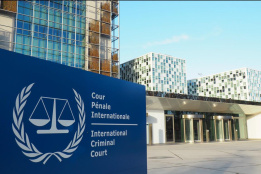On 24 April 2025 the Appeals Chamber of the International Criminal Court (ICC) issued two decisions concerning appeals filed by Israel against decisions of the Court’s Pre-Trial Chamber I in the Situation in the State of Palestine, decisions which turn primarily on questions related to Israel’s status as a non-State Party to the Rome Statute of the International Criminal Court.
Al-Haq notes that while the Appeals Chamber has granted Israel’s request to appeal one decision of the Pre-Trial Chamber in the Situation in the State of Palestine, it has rejected the others, and rejected Israel’s request for the suspensive effect of the arrest warrants, issued by Pre-Trial Chamber I against Israel’s Prime Minister Benjamin Netanyahu and former Minister of Defence Yoav Gallant on charges of war crimes and crimes against humanity.
Article 18 Challenge
On 24 April 2025, the Appeals Chamber of the International Criminal Court rejected Israel’s appeal against a decision of the Court’s Pre-Trial Chamber I which had been issued on 21 November 2024.
The decision of 21 November 2024 had determined that the Office of the Prosecutor of the ICC had conducted itself in accordance with the Court’s rules and regulations in having, on 9 March 2021, provided notice, pursuant to article 18(1) of the Rome Statute of the initiation of the investigation respecting the Situation in Palestine, with respect to “crimes within the jurisdiction of the Court that are alleged to have been committed in the Situation since 13 June 2014”, to all States Parties and other states that would normally exercise jurisdiction, including the State of Israel.
In dismissing Israel’s notice of appeal as inadmissible, the Appeals Chamber held that the subject matter of the appeal, i.e., the Article 18 Notification as issued by the Office of the Prosecutor in 2021, did not directly relate to questions of jurisdiction or admissibility within the meaning of article 82(1)(a) of the Statute. Arriving at this conclusion the Appeals Chamber recalled the Pre-Trial Chamber’s findings that Israel had not sought the deferral of the Prosecutor’s investigation when it had had the opportunity to do so, and rejected Israel’s argument that a new situation has arisen or that an investigation with new defining parameters has been taking place since 7 October 2023.
The Appeals Chamber further affirmed that Israel’s request for the suspensive effect of the arrest warrants, issued by Pre-Trial Chamber I against Israel’s Prime Minister Benjamin Netanyahu and former Minister of Defence Yoav Gallant on charges of war crimes and crimes against humanity and “any other legal acts taken by the Court based thereon” is also dismissed as moot.
Two of the Appeals Chamber judges would have permitted the appeal. Judge Ibáñez Carranza was of the view that a decision granting or denying a request under article 18 of the Statute constitutes a decision with respect to admissibility and is directly appealable under articles 18(4) and 82(1)(a) of the Statute, as it pertains to a preliminary ruling on admissibility. The judge would have remanded the matter to the Pre-Trial Chamber for a renewed assessment, including on the nature of the relationship between the ICC and non-States Parties, but would have also dismissed Israel’s request for suspensive effect of the arrest warrants as moot. Judge Solomy Balungi Bossa was of the view that the decision of the Pre-Trial Chamber on whether the Prosecutor executed his obligation to provide a notice pursuant to article 18(1) of the Statute is a preliminary ruling regarding admissibility.
Article 19 Challenge
Also on 24 April 2025, the Appeals Chamber issued a second decision, this concerning Israel’s notice of appeal of the 21 November 2024 decision of the Pre-Trial Chamber which had rejected Israel’s challenge taken under article 19(2) of the Rome Statute.
The Pre-Trial Chamber had rejected Israel’s argument that its acceptance of the Court’s jurisdiction is required under article 12 of the Statute, even if another State has delegated jurisdiction.
The Appeals Chamber has allowed Israel to appeal that decision, stating that since the subject matter concerns a ruling on the jurisdiction of the Court, the appeal is admissible under article 82(1)(a) of the Statute. As such it has decided to reverse the Impugned Decision of November 2024, on the basis that it had insufficiently addressed Israel’s central contention that article 19(2)(c) of the Statute permits it to challenge the jurisdiction of the Court, and has remanded the matter to the Pre-Trial Chamber for it to rule once more on the substance of Israel’s jurisdictional challenge.
The Appeals Chamber again dismissed Israel’s request for suspensive effect as to the arrest warrants issued against Netanyahu and Gallant, since the decision to issue the arrest warrants had not based on the impugned decision, and had been issued separately.
States Must Execute Arrest Warrants
As noted by one observer: ‘One appeal is a clear loss for Israel. The other is a partial win that, in practice, means very little. Most important of all, the Appeals Chamber refused Israel’s request to suspend the two arrest warrants — which means that they are still valid and binding on all of the states that are party to the Rome Statute.’ At a moment when the ICC is under unprecedented threat and attack, the failure of States Parties to uphold their legal obligations in executing arrest warrants against individuals accused of grave crimes undermines the very foundation of the entire international justice system.


